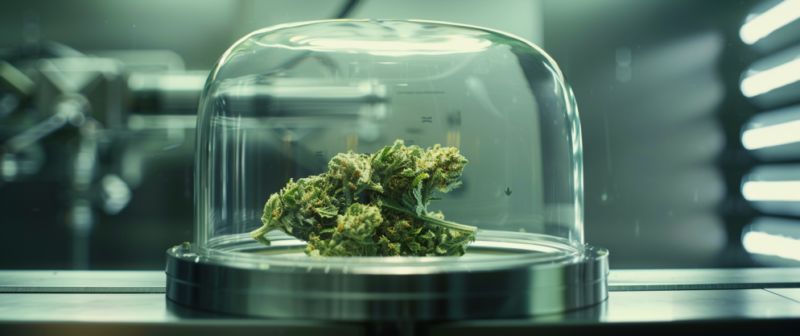How Does Delta 8 Get You So High
Are you curious about the buzz surrounding Delta 8 and how it can get you high? In this article, we’ll discuss how does delta 8 get you so high and its effects, including its interaction with the endocannabinoid system and its similarities to Delta 9 THC. Find out the potential psychoactive effects, euphoria, and relaxation that Delta 8 can offer. Learn about the differences between Delta 8 and Delta 9 THC, how it is consumed, and the potential risks and side effects to be aware of.
Stay tuned for our final thoughts on how Delta 8 can increase your experience.
What is Delta 8?
Delta 8 is a cannabinoid chemical compound found in the Cannabis plant, known for its mild psychoactive effects and therapeutic potential.
Unlike its more famous cousin, Delta-9-THC, known for its strong psychoactive properties, Delta 8 offers a more subtle and smoother experience, making it a popular choice among users seeking a milder high. Many users appreciate Delta 8 for its potential therapeutic benefits, including discomfort relief, stress reduction, and nausea suppression. It interacts with the endocannabinoid system in the body, influencing various physiological functions. Due to its unique properties, Delta 8 has been gaining attention in the cannabis community as a promising alternative with a potentially more manageable high.
How Does Delta 8 Get You So High?
Delta 8 is a psychoactive chemical compound derived from the Cannabis plant, known for its ability to interact with the endocannabinoid system to produce a high. The mechanism by which Delta 8 induces these effects involves complex interactions that are still under extensive scientific research.
Interaction With the Endocannabinoid System
Delta 8 interacts with the endocannabinoid system by binding to cannabinoid receptors in the brain, which can alter neurotransmitter release and affect mood and consciousness.
When Delta 8 binds to these receptors, it triggers a cascade of chemical reactions that influence the release of neurotransmitters throughout the brain. This interaction can lead to various effects, including feelings of relaxation, euphoria, and heightened sensory perception. The way Delta 8 affects the brain is still being studied, but evidence suggests that it may have therapeutic potential for conditions like stress and discomfort management. By modulating neurotransmitter activity, Delta 8 can produce physiological and psychological effects that vary depending on individual sensitivity and dosage.
How High Can You Get From Delta-8 THC?
The level of high you can achieve from Delta-8 THC varies significantly based on several factors, including your tolerance, the dosage, and your individual body’s response to the compound. Here are some key points to consider:
- Mild to Moderate High: Generally, Delta-8 THC produces a milder high compared to Delta-9 THC. Users often describe it as a more manageable and functional high.
- Dosage: The amount of Delta-8 THC you consume dramatically affects the intensity of the high. Low doses (e.g., 5-10 mg) may produce subtle effects, while higher doses (e.g., 20-50 mg or more) can result in a more potent high, potentially approaching the intensity of a Delta-9 THC high.
- Tolerance: Your tolerance to THC influences how high you can get from Delta-8. Regular cannabis users may require higher doses to feel the same effects as someone with a lower tolerance.
- Method of Consumption: How you consume Delta-8 THC also plays a role. Inhalation methods (smoking or vaping) typically produce faster and more intense effects compared to edibles or tinctures, which have a delayed onset but can result in a longer-lasting high.
- Individual Response: Everyone’s endocannabinoid system is different, so individual responses to Delta-8 THC can vary. Some people might feel significantly high, while others may experience only mild effects.
Effects at Different Dosages:
- Low Dose (1-10 mg): You might feel relaxed, slightly euphoric, and clear-headed. This is often enough for mild discomfort relief and stress reduction.
- Moderate Dose (10-30 mg): Increased euphoria, more noticeable relaxation, and a stronger sense of well-being. You may experience a mild to moderate high, similar to a light Delta-9 THC experience.
- High Dose (30 mg and above): More intense euphoria and relaxation, more substantial psychoactive effects, and potentially more noticeable cognitive and perceptual changes. This level might be closer to a robust Delta-9 THC high, but generally with less stress and paranoia.
Safety and Precautions:
- Start Low and Go Slow: If you are new to Delta-8 THC, begin with a low dose to see how it affects you before gradually increasing the amount.
- Know Your Source: Ensure you use a reputable product from a trusted source to avoid impurities or inaccurate dosing.
- Consider Your Environment: Use Delta-8 THC in a safe and comfortable environment, especially if you are experimenting with higher doses.
How Long Does Delta-8 THC Get You High?
The duration of a Delta-8 THC high can vary based on several factors, including the method of consumption, dosage, individual metabolism, and tolerance. Here’s a general overview:
Inhalation (Smoking or Vaping)
- Onset: Effects typically begin within a few minutes.
- Peak: Effects usually peak within 30 minutes to 1 hour.
- Duration: The high can last between 2 to 4 hours.
Edibles (Gummies, Baked Goods, etc.)
- Onset: Effects can take 30 minutes to 2 hours to begin, depending on individual metabolism and whether you’ve eaten recently.
- Peak: Effects often peak between 2 to 4 hours after ingestion.
- Duration: The high can last from 4 to 8 hours, with some residual effects potentially lingering longer.
Tinctures
- Onset: Effects can start within 15 to 45 minutes when taken sublingually (under the tongue).
- Peak: Effects generally peak around 1 to 2 hours after consumption.
- Duration: The high can last from 4 to 6 hours.
Factors Influencing Duration
- Dosage: Higher doses generally lead to a longer-lasting high.
- Tolerance: Individuals with a higher tolerance may experience shorter durations.
- Metabolism: Faster metabolisms can process Delta-8 THC more quickly, potentially shortening the duration of effects.
- Body Composition: Factors like body weight and fat content can influence how long Delta-8 THC stays in your system.
- Method of Consumption: As outlined above, the consumption process significantly affects how quickly and how long the effects last.
Individual Variability
Each person’s experience can differ, so the above timelines are general estimates. Some might find their high lasts shorter or longer than these typical durations.
How Does The Delta-8 THC High Feel Like?
The experience of a Delta-8 THC high can vary among individuals, but it is generally described as a milder and more clear-headed version of the Delta-9 THC high, which is the more common form of THC found in cannabis. Here are some common characteristics of a Delta-8 THC high:
- Clear-headedness: Delta-8 THC tends to produce a clearer-headed high, meaning users often feel more in control and less mentally foggy compared to Delta-9 THC.
- Mild Psychoactive Effects: While Delta-8 THC is psychoactive, its effects are usually milder. Users might feel slightly altered but not as intensely as they would with Delta-9 THC.
- Increased Appetite: Like Delta-9 THC, Delta-8 can stimulate appetite, sometimes called the “munchies.”
- Less Sedation: Compared to Delta-9 THC, Delta-8 is less likely to cause heavy sedation, making it a more suitable option for daytime use for some users.
What Are The Effects Of Delta 8?
The effects of Delta 8 vary widely among users but are generally known to include psychoactive effects, euphoria, and relaxation, with some individuals reporting relief from stress.
Psychoactive Effects
Delta 8’s psychoactive effects are primarily due to its interaction with the brain’s receptors, which can alter consciousness and mood.
Delta 8, a lesser-known cannabinoid with potent properties, has been found to bind to both CB1 and CB2 receptors in the brain. This interaction affects the release of neurotransmitters and ultimately influences one’s state of mind and emotions. It leads to a subtle shift in the way an individual perceives reality and processes feelings, thereby impacting their overall mood and cognition.
Euphoria
Many users report experiencing euphoria after consuming Delta 8, which can have a significant impact on mental health and mood, often leading to stress relief.
Delta 8, a derivative of THC known for its psychoactive effects, interacts with the body’s endocannabinoid system.
When Delta 8 binds to the cannabinoid receptors in the brain, it triggers the release of dopamine and serotonin, neurotransmitters responsible for feelings of pleasure and well-being.
This surge in feel-good chemicals uplifts the user’s mood, helps reduce stress, and promotes a sense of relaxation.
Relaxation
One of the most commonly reported effects of Delta 8 is relaxation, which can help reduce stress and improve sleep by calming the central nervous system.
When Delta 8 interacts with the body’s endocannabinoid system, it triggers a response leading to calm and relaxation. This calming effect can benefit individuals dealing with daily stressors or sleeping disturbances. By promoting relaxation, Delta 8 can also help alleviate symptoms of stress and tension, allowing the mind and body to unwind after a long day. The ability of Delta 8 to soothe the central nervous system can create a more conducive environment for falling asleep and improving overall sleep quality. As a result, many people find that incorporating Delta 8 into their wellness routine can positively impact their stress levels and sleep patterns.
What Are The Potential Risks And Side Effects Of Delta 8?
While Delta 8 is generally considered to be less potent than Delta 9 THC, it still carries potential risks and side effects, including dry mouth, red eyes, dizziness, and paranoia.
Dry Mouth
One common side effect of Delta 8 consumption is dry mouth, which occurs due to its interaction with the central nervous system. This could potentially affect the body’s hydration levels.
When Delta 8 THC enters your system, it binds to cannabinoid receptors in the brain, altering saliva production and leading to dry mouth. This reduction in saliva can make the mouth feel dehydrated and uncomfortable.
Maintaining adequate hydration levels when consuming Delta 8 is crucial to counteract the dry mouth effect. Drinking plenty of water helps alleviate the discomfort and supports overall well-being.
Red Eyes
Red eyes are another potential side effect of Delta 8, often resulting from changes in blood pressure caused by the cannabinoid.
When Delta 8 is consumed, it interacts with the body’s endocannabinoid system, leading to fluctuations in blood pressure levels. These changes can dilate the blood vessels in the eyes, causing them to appear red and bloodshot. Delta 8’s impact on blood pressure can alter circulation patterns, affecting the flow of blood to the eyes and contributing to redness. While not everyone experiences this side effect, individuals with sensitivity to changes in blood pressure may be more prone to developing red eyes after consuming Delta 8 products.
Dizziness
Dizziness is a possible side effect of Delta 8, often related to its impact on the brain, dosage, and individual metabolism.
When Delta 8 is consumed, it interacts with the brain’s receptors, altering neurotransmitter levels and potentially causing imbalance, leading to dizziness. The appropriate dosage is crucial, as taking too much can overwhelm the system and trigger adverse reactions like dizziness. Individual metabolism plays a significant role; people with faster metabolisms may process Delta 8 quicker, affecting its duration and intensity of impact on the body, potentially influencing dizziness occurrence.
Paranoia
Paranoia is one of the more severe side effects of Delta 8, potentially altering mood and consciousness through its interaction with the brain.
When Delta 8 THC enters the body, it interacts with the brain’s endocannabinoid system, which plays a crucial role in regulating various functions, including mood and perception. This interaction can disrupt the balance of neurotransmitters in the brain, leading to distorted perceptions and heightened stress.
Delta 8’s psychoactive properties can amplify existing worries or fears, causing a sense of unease and irrational thoughts. This altered state of consciousness can make individuals hypersensitive to their surroundings, leading to an intensified feeling of paranoia.
How Is Delta 8 Consumed?
Delta 8 can be consumed in various forms, including smoking, vaping, edibles, tinctures, and topicals, each method offering unique benefits and effects depending on user preference.
Smoking
Smoking Delta 8 involves inhaling the cannabinoid through combustion, quickly delivering the chemical compound into the bloodstream for fast effects.
Once the Delta 8 is smoked, it passes through the lungs, where the cannabinoid rapidly enters the bloodstream due to the highly efficient absorption in the alveoli. This immediate delivery system means that users can feel the effects much quicker than other consumption methods. The high bioavailability of smoking Delta 8 results in a more potent experience, making it a preferred choice for those seeking fast relief or intense euphoria. It’s crucial to be mindful of the potential risks of inhaling any smoke, even when it involves a chemical compound like Delta 8.
Vaping
Vaping Delta 8 is an alternative to smoking that can offer a controlled dose and potentially smoother experience, affecting potency and metabolism differently.
When you vape Delta 8, the dosage can be more precise due to the ability to adjust settings on the vape device, allowing for a tailored experience. This customization is particularly beneficial for those looking for a specific effect level. The potency of Delta 8 through vaping can also feel more consistent compared to smoking, as the heat from the vape device activates the compound efficiently.
Vaping Delta 8 may affect your metabolism differently than smoking. The inhalation of vapor can lead to faster absorption into the bloodstream, potentially providing a quicker onset of effects. This rapid action can be advantageous for individuals seeking immediate relief or relaxation.
Edibles
Edibles infused with Delta 8 are metabolized differently than inhalation methods, resulting in potentially delayed but long-lasting effects, and are subject to FDA regulations.
When Delta 8 is consumed through edibles, its journey through the digestive system alters how it is broken down and absorbed by the body. This process can take longer than inhaling it, leading to a slower onset of effects.
Delta 8’s metabolism through edibles involves the liver metabolizing the compound into 11-hydroxy-THC, which is believed to be more potent and longer-lasting than the initial Delta 8 itself.
Dosing edibles requires caution due to their delayed effects. Users may be tempted to consume more before feeling the full impact, leading to potential overconsumption.
In the world of regulatory standards, the FDA closely monitors the market for Delta 8 edibles, scrutinizing their safety, labeling, and marketing claims to protect consumers from potential harm.
Tinctures
Delta 8 tinctures offer a versatile consumption method. Users can control the concentration and dose for tailored relaxation effects.
Depending on individual preferences, Delta 8 tinctures can be easily incorporated into daily routines. Whether adding a few drops to a morning smoothie or taking them straight under the tongue, the flexibility of dosing makes it convenient for various schedules. The ability to adjust the concentration also gives users the power to personalize their experience, whether seeking a subtle calm or deep relaxation. Plus, the fast-acting nature of tinctures ensures quick relief for those needing immediate relaxation benefits.
Topicals
Topical applications of Delta 8 involve direct absorption through the skin, potentially targeting localized discomfort management and interacting with the central nervous system.
When Delta 8 is applied topically, it can bypass the digestive system and liver metabolism, allowing quicker absorption into the bloodstream. This direct route enables the Delta 8 compounds to interact with the endocannabinoid receptors in the skin, muscles, and nerves, providing potential relief for specific areas of discomfort.
Since Delta 8 can bind to both CB1 and CB2 receptors in the endocannabinoid system, the topical application may modulate discomfort perception and irritation responses at the application site. Delta 8 topicals may offer a more targeted approach than oral consumption, making them ideal for localized discomfort management.
Final Thoughts – How Does Delta 8 Get You So High
Delta 8 offers a unique experience due to its interaction with the endocannabinoid system and its psychoactive effects, distinguishing it from other cannabinoids.
When Delta 8 enters the body, it primarily interacts with the CB1 receptors in the endocannabinoid system, which are concentrated in the central nervous system. This interaction triggers the release of neurotransmitters such as dopamine and produces the characteristic ‘high’ associated with Delta 8. The effects can vary from person to person depending on factors like dosage, tolerance levels, and individual body chemistry.
Frequently Asked Questions
Is Delta 8 the same as Delta 9?
While both Delta 8 and Delta 9 are psychoactive compounds found in cannabis, they have slight chemical differences that affect their potency and effects. Delta 8 is known for producing a less intense high than Delta 9.
How does Delta 8 differ from CBD?
CBD, or cannabidiol, is another compound found in cannabis, but it is not psychoactive. Unlike Delta 8, CBD does not produce a high when consumed. Delta 8 and CBD both have potential therapeutic benefits and can be used for different purposes.
How long does it take for Delta 8 to kick in?
The time it takes for Delta 8 to take effect varies depending on the method of consumption. When inhaled, Delta 8 can produce effects within a few minutes, while edibles may take up to an hour to kick in. It is essential to start with a low dose and wait for the effects before consuming more.
Is Delta 8 legal?
Delta 8’s legality varies by state, but it is currently legal under federal law. However, some states have placed restrictions on its sale and use. It is important to check the laws in your state before purchasing or consuming Delta 8 products.


